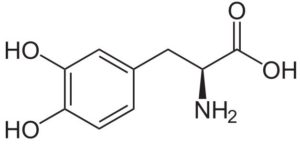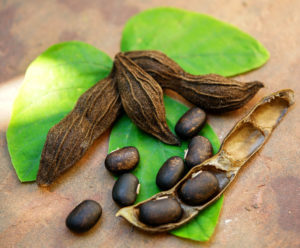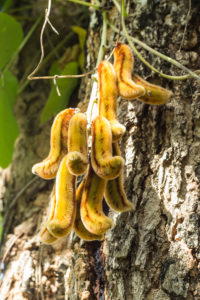Table of Contents
Key Takeaways
- L-DOPA is a vital amino acid precursor of neurotransmitters dopamine, epinephrine, and norepinephrine synthesized in the brain from l-tyrosine.
- Mucuna Pruriens is a natural source of L-DOPA, used as a nootropic to enhance brain function by increasing dopamine levels.
- L-DOPA from Mucuna Pruriens can improve memory, cognition, mood, and overall brain health while reducing stress and acting as an antidepressant.
- Opt for organic Mucuna Pruriens extract with higher L-DOPA concentrations (15% – 30%) to ensure better tolerance and efficacy, avoiding synthetic versions used for Parkinson’s treatment.
- Nootropic use of L-DOPA is generally safe and well-tolerated, but caution is necessary to avoid tolerance and dependence issues.
See my article on all of the supplements that have been shown to help with Parkinson’s here: Best Supplements for Parkinson’s Disease
L-DOPA (levodopa, L-3,4-dihydroxyphenylalanine) is an amino acid synthesized in your brain by the amino acid l-tyrosine. L-DOPA is a precursor of several neurotransmitters including dopamine, epinephrine, and norepinephrine.
Mucuna Pruriens contains naturally occurring L-DOPA in high concentrations. And is used as a nootropic because dopamine itself cannot cross the blood-brain barrier.
Dopamine and norepinephrine are essential for memory, cognition, and a positive mood. A lack of either of these neurotransmitters can lead to a lower mood state, loss of memory, brain fog, poor energy, and more. And if left unchecked will eventually result in neurodegenerative diseases like Parkinson’s.
L-DOPA helps:
- Brain Health. L-DOPA helps to increase growth hormone levels in the brain. Boosting the production of neurons and glia cells affecting the formation of memories, and overall brain health.
- Neurotransmitters. L-DOPA is a necessary precursor for your brain to make dopamine. And dopamine is then synthesized into the neurotransmitters epinephrine, and norepinephrine. Affecting cognition, learning, memory, movement, motivation and pleasure.
- Neuroprotection. L-DOPA produces neuromelanin which is similar to the melanin pigment in your skin. In your brain they absorb toxic quinones, and chelate heavy metals like mercury and lead.
Overview
L-DOPA (levodopa, L-3,4-dihydroxyphenylalanine) is an amino acid that’s naturally synthesized in your brain by the amino acid l-tyrosine.

L-DOPA is a necessary precursor to the synthesis of the neurotransmitter dopamine. Called a catecholamine, dopamine is then synthesized into the other catecholamines epinephrine (adrenaline) and norepinephrine (noradrenaline).
Unlike Dopamine, L-DOPA can cross the blood-brain barrier. This is why we supplement with L-DOPA rather than dopamine.

And for a dopamine boost, neurohackers use Mucuna Pruriens, which contains high levels of L-DOPA.[i] This legume, native to the tropical regions of India, Africa and the West Indies, and also known as velvet bean, has been used in Ayurveda medicine since 1500 B.C.
The ancients used Mucuna Pruriens to treat things like snakebite, intestinal problems, sexual issues, and a melancholy mood.
Raising levels of the neurotransmitter dopamine in your brain helps regulate mood and cognition.[ii]
Mucuna Pruriens vs. L-DOPA: What’s the Difference?
Mucuna Pruriens is an extract of the velvet bean plant that grows 3 – 18 meters in height. L-DOPA (levodopa) is usually synthetic and made in the lab.
The natural version of L-DOPA from Mucuna Pruriens is generally well-tolerated by most people. And the compounds in the plant are bio-identical to those chemicals naturally made in your body. Not so with synthetic L-DOPA.
Synthetic L-DOPA is metabolized into dopamine in your body by an enzyme called aromatic L-amino acid decarboxylase (AADC). And the majority of synthetic L-DOPA will be converted peripherally (not in the central nervous system and brain). This can cause problems.
So when used therapeutically, as in treating Parkinson’s Disease, L-DOPA is administered in combination with an inhibitor of peripheral AADC. Drugs like carbidopa (or other AADC inhibitors) ensure most of the L-DOPA is preserved for conversion to dopamine in the brain. And not the rest of your body.
This is critical for nootropic users to keep in mind. Chronic, or prolonged use of synthetic L-DOPA can lead to things like dyskinesia. This is a movement disorder where neurological discoordination results in uncontrollable, involuntary movements.[iii]
I am not telling you this to dissuade you from using L-DOPA. Stick with an extract of Mucuna Pruriens and you should be fine.
How does L-DOPA Work in the Brain?
L-DOPA boosts brain health and function in several ways. But two in particular stand out.
- L-DOPA improves memory. It’s metabolized into dopamine in your body by an enzyme called aromatic L-amino acid decarboxylase (AADC). This increases dopamine levels in your brain.
Researchers at the University of Münster in Germany conducted a study with 40 healthy people. In this randomized double-blind study, they gave one group 100 mg of levodopa daily for 5 days. The other group took a placebo.
90 minutes later on each day, subjects were given a memory test based on vocabulary. The study found that levodopa significantly enhanced the speed, overall success, and long-term retention of novel words.[iv]
- L-DOPA promotes brain health. Research suggests Mucuna Pruriens protects your brain by regulating cognitive and neural functions. And even encouraging neural activity.
Researchers in India showed that Mucuna Pruriens is a potent antioxidant. They performed assays to evaluate the enzymatic and nonenzymatic antioxidants in extracts. They found high levels of flavonoids, alkaloids, tannic acids, gallic acids, quercetin equivalents, and sitosterol equivalents.[v]
All of these compounds scavenge for free radical in your brain. Free radicals are formed during normal brain activity, like the synthesis of ATP that is produced in your mitochondria.
Your brain is equipped to eliminate some of these free radicals on its own. But especially in today’s environment in which we live, your brain is overwhelmed. Free radicals cause inflammation which damages and can kill brain cells. Affecting memory, learning, recall, cognition and mood.
Mucuna Pruriens has been proven to be a very effective brain inflammation fighter. It even has the ability to chelate heavy metals like mercury and lead in brain cells. And it’s antibacterial.[vi]
Mucuna Pruriens helps your brain make naturally occurring neuronal pigments called neuromelanin’s. They’re similar to the melanin found in your skin. And they’re often found in regions of your brain where dopamine is active.
The synthesis of neuromelanin’s in the various regions of your brain is an important protective process. The melanic component is generated through the removal of reactive/toxic quinones that would otherwise cause neurotoxicity.
This melanic component promoted by Mucuna Pruriens is what chelates and accumulates toxic, heavy metals like mercury and lead.[vii] Preventing them from damaging brain cells.
How things go bad
As we get older, our brain chemistry and energy metabolism changes.
↓ Dopaminergic neurons are damaged or die
↓ Dopamine levels decline
↑ Stress levels increase
↓ Long-term memory and mood decline
All of these age-related changes are contributing factors to the neurodegenerative diseases of aging, including Parkinson’s Disease.
L-DOPA benefits for brain health
Mucuna Pruriens natural herbal supplement extract contains high levels of L-DOPA, the precursor to the crucial neurotransmitter dopamine. Dopamine is further synthesized into the neurotransmitters epinephrine (adrenaline) and norepinephrine (noradrenaline).
Dopamine plays a critical role in learning and absorbing new information. Increasing brain levels of dopamine helps regulate mood and boosts cognition.
Research also suggests that Mucuna Pruriens provides antioxidants that defend against oxidative damage caused by free radicals.[viii]
How does L-DOPA feel?
Neurohackers report that using Mucuna Pruriens helps in multi-tasking, improving motivation, more focus, less stress, and a sense of calm.
You could find your energy levels increase, less brain fog, and a boost in overall mood. A more positive outlook on life. And an increase in libido.
L-DOPA Clinical Research
Mucuna Pruriens (L-DOPA) as an
alternative for Parkinson’s Disease
Researchers at the Parkinson’s Institute located at the University of Milan in Italy recruited 18 patients with advanced Parkinson’s Disease. The patients were given either ground Mucuna Pruriens powder (standardized 5.7% L-DOPA) or prescription form of levodopa containing a dopa-decarboxylase inhibitor. And then measured motor improvements at 60 and 90 minutes after using the supplement or drug.
The researchers found Mucuna Pruriens standardized powder produced reduced Parkinson’s symptoms equivalent to the prescription version of levodopa. But with significantly fewer problems with dyskinesias. The team concluded the “Clinical effects of high-dose Mucuna Pruriens were similar to levodopa alone at the same dose, with a more favorable tolerability profile“.
Mucuna Pruriens reduces stress
A study was conducted to assess the role of Mucuna Pruriens in infertile men. It was done at King George’s Medical University in Lucknow, India. The study included 60 men who were undergoing infertility screening. And no surprise here; were found to be suffering from stress.
The control group in this study were 60 age-matched men who had initiated at least one pregnancy. The infertile men were given 5 grams of Mucuna Pruriens seed powder per day for 3 months. Semen samples were collected at the beginning of the study. And after 3 months of treatment.
The researchers found that treatment with Mucuna Pruriens significantly decreased stress levels. And increased sperm count to the same level as the fertile control group of men.
They “concluded that M. pruriens not only reactivates the anti-oxidant defense system of infertile men but it also helps in the management of stress and improves semen quality.”[ix]
L-DOPA improves learning
This study in Germany was done with 40 healthy subjects. They were given 100 mg of L-DOPA or a placebo for 5 days in a randomized, double-blind trial.
Subjects were trained on artificial vocabulary using a high-frequency, repetitive approach. This was done 90 minutes after L-DOPA administration on each day of the trial.
The researchers found that L-DOPA significantly enhanced the speed, overall success, and long-term retention of the words.[x]
L-DOPA as an anti-depressant
Increasing dopamine in your brain also boosts your mood and libido. This study was done in India with mice. Researchers used the well-known Forced Swimming Test (FST), Tail Suspension Test (TST), and Chronic Unpredictable Mild Stress (CUMS) test.
The mice were fed Mucuna Pruriens seed extract, and then evaluated while performing, well… what mice do in the lab. The research team found that Mucuna Pruriens seed extract has significant antidepressant qualities. Which would simply verify what we already know in humans.[xi]
Using Mucuna Pruriens extract is a great anti-depressant.
L-DOPA Recommended Dosage
L-DOPA (Mucuna Pruriens extract) suggested dosage for cognitive benefits is 250 – 500 mg twice per day. Most Mucuna Pruriens extracts only contain 15 – 20% L-DOPA. So you may need to adjust your dose up or down depending on how you respond to this supplement.
You may also find that you need to cycle the use of L-DOPA (Mucuna Pruriens). And use it only 4 or 5 days a week. This can help avoid tolerances and dependencies (which are common with any dopamine agonist). DO NOT attempt to cycle this nootropic if you are using it to treat Parkinson’s Disease.
If you are using Mucuna Pruriens extract (L-DOPA) for Parkinson’s Disease you will likely need 500 – 1,000 mg Mucuna Pruriens 3 or more times per day. And look for a Mucuna Pruriens extract (98% L-DOPA).
See my article on all of the supplements that have been shown to help with Parkinson’s here: Best Supplements for Parkinson’s Disease
L-DOPA Side Effects
L-DOPA is produced naturally in your body. So is considered well-tolerated and safe. And L-DOPA from Mucuna Pruriens extract is particularly well tolerated by most people.
Research shows that the natural form of L-DOPA from Mucuna Pruriens compared to synthetic versions of L-DOPA provides similar results. But without the common side effects of nausea, vomiting, and involuntary muscle movement.[xii]
But be very careful when working with dopamine. Too much and you can experience symptoms like hair loss, auditory or visual hallucinations, psychosis, Dyskinesia and more.
Of course, if you begin to experience any of these side effects, stop supplementing with L-DOPA (Mucuna Pruriens) immediately.
Like any natural supplement, it’s always better to use an organic source.

Type of Mucuna Pruriens (L-DOPA) to buy
Mucuna Pruriens is typically available in powder, capsule or tablet form. Some are pure, dried Mucuna Pruriens powder.
Several manufacturers offer Mucuna Pruriens extracts ranging from 15% – 30% L-DOPA. Or they tell you how many mg of L-DOPA is in each capsule or tablet.
A few manufacturers call it “Velvet Bean Extract” or “Mucuna Extract” with the percentage of L-DOPA in each capsule or tablet. It’s the same as Mucuna Pruriens.
Try to find “organic” or “certified organic” if you can. And for Nootropic use, avoid synthetic L-DOPA which is typically used to treat Parkinson’s Disease.
Nootropics Expert Recommendation
L-DOPA (Mucuna Pruriens) dosage 250 – 500 mg twice per day
 I recommend using L-DOPA as a nootropic supplement.
I recommend using L-DOPA as a nootropic supplement.
Your body does synthesize some L-DOPA on its own. And converts it into the essential neurotransmitters dopamine, epinephrine, and norepinephrine.
But as you get older, dopamine receptors die or become unresponsive. Or your body doesn’t convert the necessary amino acids well enough to supply the neurotransmitters you need for an optimized brain.
L-DOPA is helpful to boost energy and motivation levels, memory, clear brain fog, improve mood and libido.
L-DOPA is especially helpful for those suffering from neurodegenerative diseases like Parkinson’s. And the natural form of L-DOPA from Mucuna Pruriens often offers better results with fewer side effects than prescription drugs.
I suggest starting with a dose of 100 – 250 mg twice daily for nootropic use at first. And you may find that you need to cycle L-DOPA. Use it for 4 or 5 days and take a break. Tolerance is often a problem when working with dopamine. As is dependence or addiction.
If you are using Mucuna Pruriens (L-DOPA) for Parkinson’s Disease, please see my article on all of the supplements that have been shown to help with Parkinson’s here: Best Supplements for Parkinson’s Disease









Join The Discussion - 407 comments
Vickie
April 23, 2025
My husband has acquired uncontrollable involuntary movements. They have tested his brain, MRI and ECG, and done hours of neurological testing, only to find no real reason. They said he’s extremely intelligent and has ADD; we knew this. After 4 years of trying to find the right meds for his depression/anxiety, he is taking Auvelity with additional low dose of bupropion. He’s done great with this. He’s been on it for about 2 years. He fears going back to feeling like he did before if they take him off of it because of the worsening movements. Will Mucuna Puriens possibly help him at all, if not, any suggestions.
David Tomen
April 24, 2025
Vickie, Mucuna Pruriens contains L-DOPA which is contraindicated with the drugs your husband is using. But if he stops using both drugs then Mucuna should not be a problem. But is may not provide the same benefit as the drugs provide.
Michael Villumsen
January 30, 2025
hi
do you recommend mucuna for add, instead of stimulants??
David Tomen
January 31, 2025
Michael, I recommend using L-Tyrosine instead of Mucuna Pruriens. It is easier to get the dose right, is safe to use long term, and contributes to thyroid health as well.
Dena
October 28, 2024
I was taking a Mucuna Pruriens supplement for 20 days, it helped me so much. Unfortunately I had an eye twitch and heart fluttering that was not going away. I stopped the supplement and it has gone away. Do you think I could just stop taking for a few days and start again, or how does the cycle on cycle off work?
David Tomen
October 29, 2024
Dena, it sounds like you were getting more dopamine and norepinephrine than your body needs. If you are not dealing with Parkinson’s and you want to increase dopamine then use L-Tyrosine instead. It is easier to adjust the dose.
Dena
October 30, 2024
I was actually thinking DLPA instead, what do you think?
David Tomen
October 30, 2024
Dena, I suggest testing both Tyrosine and DLPA. Some prefer one over the other. Remember DLPA is 3-steps aways from producing dopamine. And Tyrosine is 2-steps away. Each should work equally fast but it depends on how your system responds.
Dena
October 31, 2024
I used Tyrosine for a long time but sadly nothing worked like Mucuna Pruriens! I have never felt that good in my life. If only I did not have the eye twitch and heart flutter. 🙁
Shahzad Mohiuddin
October 8, 2024
hi David,
I have a question. so you know how you said everytime you increase dopamine, you decrease serotonin. and every time you increase serotonin, you end up decreasing dopamine? and the only way you can increase these neurotransmitters is through L-DOPA and L-tryptophan. but what about when it comes to releasing agents like caffeine, amphetamines or SSRI. these things release or reuptake these neurotransmitters right? so does using caffeine to release dopamime deplete serotonin? and does reuptaking serotonin through SSRIs decrease dopamine?
please help me with this.
shahzad
David Tomen
October 11, 2024
Shahzad, you need to understand the exact mechanism of action for each of the supplements you are talking about. L-DOPA are L-Tryptophan direct precursors to increase the production of those neurotransmitters. But the others are not.
And the balance between dopamine and serotonin I am referring to happens only when those are increased in excess. In other words if you used 500 – 1,000 mg L-DOPA 2 or 3-times per day for several days then you’ll likely tank serotonin. The reverse is true as well.
Caffeine can cause dopamine depletion only because it forces your brain to use up the dopamine that is there. That has nothing to do with serotonin. This is what I mean by a different mechanism of action.
The neuroscience behind each of these supplements can be pretty complicated. But it is my strong opinion that if a person is going to use a supplement it would be wise to learn that neuroscience before you put that supplement into your system. That is why I created this website.
Szilvia
June 22, 2024
Dear David!
Unfortunately, I took one of the SSRI antidepressants, Paroxat, for a very long time (26 years). I left it completely 3.5 months ago because it caused a lot of restlessness and agitation, words cannot even describe what I experienced and am still experiencing… 🙁 After reading it, I found that this condition is akathisia… 🙁 🙁
It still hasn’t completely gone away, and there are even dietary supplements that strongly provoke it again.
Here’s what I found about it: Selective serotonin reuptake inhibitors (SSRIs) can occasionally cause extrapyramidal side effects (EPS) and/or akathisia. This may be a consequence of serotonergic-mediated inhibition of the dopaminergic system.
Could you recommend a dietary supplement that would help alleviate this condition, or what you don’t recommend taking?
Thank you very much.
David Tomen
June 22, 2024
Szilvia, it’s called “Antidepressant discontinuation syndrome” or in your case “Post-acute-withdrawal syndrome” for someone who has used any one of these drugs for many years.
Doctors don’t know about it, have not been warned about it by drug companies, and the drug companies deny it (no surprise) because many go through such horrid side effects that they end up back on the drug. So the drug companies continue to get richer and richer.
Research is recent and ongoing on what these drugs do the human brain. But it is starting to look like genetic mutations on the mRNA level. Receptors become non-responsive.
There is no proven regimen for naturally dealing with discontinuation syndrome. And i am not sure it is even possible.
A very few have had some success by supplementing with Creatine, Omega-3s (higher in EPA than DHA), prebiotic, taurine, magnesium L-Threonate, a BioActive B-Complex and BioActive Multivitamin, Vitamin D, CDP-Choline, L-Tyrosine, and ALCAR. No one has tested it that I know of but I think Black Seed Oil may help as well.
Dosage recommendations are included in each of my reviews on this website if you want to try it. I have not the time to do any deeper that this.
Szilvia you have already asked 35 questions to which I have responded. If you need any more help I suggest you schedule a consultation with me. Because I will not accept any further questions from you. It’s not fair to the thousands of others who need help here.
Petrus
June 20, 2024
Hi
What is Mucuna Pruriens half eliminate time, or how long it stay in your system. Can’t found any answers for that.
David Tomen
June 20, 2024
Petrus, the half-life of L-DOPA which is extracted from Mucuna Pruriens is 2-3 hours.
Rob
May 13, 2024
David:
Does Mucuna pruriens cause weight gain in senior men?
Can it have an adverse effect on blood pressure for senior men with hypertension?
David Tomen
June 11, 2024
Rob, I have never heard of Mucuna Pruriens causing weight gain at any age. But increasing dopamine may mess with your blood pressure. As long as your doc has you using blood pressure meds to keep it under control you should be fine.